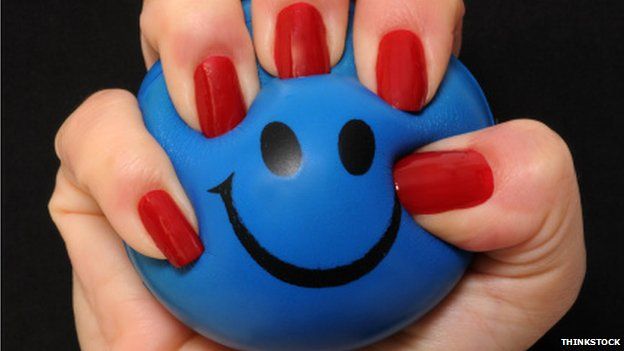Distraction during surgery 'reduces anxiety and pain'
- Published

Using a stress ball or watching a DVD during surgery can reduce a patient's anxiety levels, suggests a study from the University of Surrey.
Patients said their pain levels were also reduced by chatting to nurses while under local anaesthetic.
Nearly 400 patients were distracted in different ways while having varicose vein surgery after which their pain and anxiety levels were measured.
Simple distractions could improve the patient experience, the study said.
People can become very anxious during surgery, particularly when they are conscious while it is happening.
They may be stressed by the sights and sounds of the operating theatre, the feeling of the surgeon working on them or concerned about how well the anaesthesia is working.
Keep calm
While anxiety is a common response during surgery, the researchers say high levels of anxiety can also lead to more pain after the operation.
Distractions have previously been found to help relax patients before, during and after surgery.
Keeping patients calm diverts their attention from the pain and helps reduce their feelings of anxiety.
In this study, different distractions were compared by giving patients either a DVD to watch, music to listen to, a nurse to talk to or a stress ball to hold during their surgery.
A questionnaire was then used to assess their pain and anxiety levels.
Anxiety was found to be significantly lower in those who watched a DVD, interacted with nurses or handled stress balls compared with the usual treatment.
Pain was significantly lower in those who talked to nurses and handled stress balls compared with no distractions.
Music miss
Surprisingly, the researchers found no significant effect on pain or anxiety from listening to music, which is in contrast to previous research.
The study, lead by Prof Jane Ogden at the University of Surrey, said this could be because music demanded less brain input than the other distractions: "It is intuitive that audiovisual stimuli proved more beneficial in terms of pain and anxiety reduction than music alone, given the greater cognitive demands of the stimuli."
Given the minimal cost of the distractions studied, the research team said patients and healthcare providers should be aware of the positive findings.
"At the very least, none of the interventions studied worsened the patient experience," they said.
"Therefore we support their use, or the option of their use in routine practice."
- Published21 January 2015